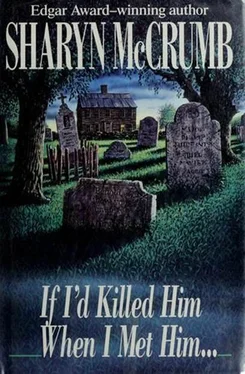Women twenty years older than A. P. Hill might have taken this feeble witticism as a compliment, but tributes to Powell’s youthfulness were wasted on a woman who took offense at waiters who requested an ID before bringing her a glass of wine. She knew better than to antagonize a potential witness, however; so she managed a semblance of pleasantry as the slender, blonde woman in the Donna Karan suit led her into the house.
“I just can’t believe that Eleanor actually did it,” said Marizel Farrell, after they had settled in the white-and-gold living room. “Shot Jeb, I mean.”
“Why can’t you believe it?” asked A. P. Hill, noting the date and time at the top of her yellow legal pad. She also wrote down Mrs. Farrell’s name and address, estimating her age at an accurate, but unflattering fifty-five.
Marizel spread her hands in a helpless little shrug. “Well, because it’s such a trashy thing to do. I mean, people shoot each other in trailer parks, for God’s sake, not in Chambord Oaks.”
“I see,” said A. P. Hill, deciding to forgo the lecture in sociology that was probably called for. “Tell me about them as a couple. How did you meet them?”
“How does one meet anyone?” said Marizel Farrell with her wide-eyed stare. “Our husbands were not colleagues. Jeb was a lawyer; Arthur is a surgeon. But we were in that professional social set-in some ways, Roanoke is a very small town. I suppose we attended the same dinner party, or got put at the same table at a charity event. I can’t really remember. We’ve known them for a dozen years at least.”
A. P. Hill’s eyebrows maintained a steadfast neutrality. “Eleanor Royden says that you were her closest friend.”
“How terribly sad,” said Marizel Farrell, shaking her head, more in anger than in sorrow. “You know, she was once quite a nice person, always fun to be around, and very energetic. We cochaired a couple of symphony fund-raisers together back in the mid Eighties, and at the Homeless Shelter Gala, we shared a table with the Roydens. Let me see… and bridge and tennis. I mean, I saw a lot of Eleanor, you know-the way one does; that is, until lately, when she had to get a job , and became very arch and brittle about her reduced circumstances, and then, of course, one simply had to stop seeing her. One was embarrassed.”
A. P. Hill looked up from her notes. “So she didn’t confide in you about her frustration over the divorce?”
“I’d hardly call it confiding,” said Marizel Farrell with a little laugh. “She certainly complained about it constantly to anyone who would listen. And she tried to be amusing about it. I’ll give her that. But, really, what could one do? She didn’t belong to the club anymore, and she couldn’t afford the usual outings of the old set, and her job kept her from the women-only socializing in the daytime. I went to lunch with her a couple of times downtown when she started working, and once I took her to the ballet on Arthur’s ticket when he had an emergency at the hospital, but I felt quite awkward around her. What could one say to her? Of course, we all thought Jeb’s behavior was dreadful.”
“I understand that it was a bitter divorce.”
“Oh, it was! But Eleanor was partly to blame for that, too. Jeb Royden was a cold, calculating attorney who had gotten his own way all his life. He could be completely charming as long as no one stood in his way. And of course he had a fling with a younger woman. I mean, it’s utterly commonplace . Men are quite childlike, really. The minute their hair starts thinning out and their eyes require reading glasses, they start looking for Band-Aids for the ego. You just ignore it as long as you can and hope it wears off. We tried to tell Eleanor that at first! Much good it did.”
A. P. Hill, who came from a different generation than Mrs. Farrell, was privately in sympathy with Eleanor Royden’s attitude. In fact, she thought, her own behavior in similar circumstances could be used as a training film for terrorists; wisely, she refrained from expressing this opinion. “So you all thought that Mr. Royden would have his fling without resorting to divorce?”
“Well, they usually do,” said Marizel. “I got a new Mercedes after Arthur’s little indiscretion, but then I earned it. I was sweet as pie the entire time and I never once reproached him or let him see me cry.”
This was Martian to A. P. Hill, but she merely nodded for Mrs. Farrell to continue.
“I told Eleanor not to throw tantrums over it. We all learned how to suffer in silence, but, oh no!- Miss High-and-Mighty Eleanor was too proud to be sensible. She made scenes in public. She confronted the bimbo and she screamed at Jeb and argued with him, until he had to leave her. Jeb Royden wasn’t the sort of man to let his wife tell him what to do. She made him furious and he walked out.” Marizel Farrell shrugged. “Then, of course, he set out to punish Eleanor with the divorce court’s version of the siege of Leningrad.”
“So you thought that Mrs. Royden’s ex-husband was being vindictive?”
“My dear, he was ! Jeb wanted to have his own way, without any arguments, and when Eleanor wouldn’t agree to that, he set out to destroy her for being uppity. They’re all like that. Anybody could have told her. Of course, he thought he would ruin her financially, and send her off to work as a waitress and live in a trailer, while he built a palace for the new playmate. I suppose he underestimated Eleanor, though.”
A. P. Hill nodded, suppressing a smile. “She refused to take the thunderbolt lying down.”
“Yes-and of course, we’re all terribly sympathetic with poor Eleanor, even though she brought it on herself. At first we thought of having a benefit luncheon at the club to raise money for her defense fund, but then we were afraid that our husbands might not care for the idea. You will give her my best, though, won’t you, dear?”
“I’ll give her my best,” said A. P. Hill.
MACPHERSON & HILL
ATTORNEYS-AT-LAW
DANVILLE , VIRGINIA

Dear Cameron:
I have survived Mother’s first postdivorce party. It was quite a charming gathering, although I did not find the conversation all that different from the more traditional neighborhood parties that she and Daddy used to give. People still droned on about floor coverings and children; I did not see that having the opposite sex introduce the topic made the discussion any more scintillating. I must be depressed. I find everyone boring; but they were all quite likable folks, and I’m sure Mother will be happy with her new social set.
If she doesn’t starve to death.
Apparently, while I was frivoling my youth away in Scotland, eating went out of fashion in the U.S. Long before dinner was served, the guests began talking about their various dietary requirements. Most of them were vegetarians or vegans, and a few were ovo-lacto vegetarians, although Tim Burruss is really a reckless hedonist: he eats fish- once a week, steamed or broiled. I did think that in his honor (and mine) a salmon mousse-or even a moose mousse-could have been sacrificed for the sake of the unregenerate carnivores, but obviously our hostesses were not feeling quite so wickedly unconventional. The fish was spared, and we starved.
I was wondering if I ought to slip outside and promise Bill a stop at Burger King on the way home, but then he got called away to see about one of his clients, so I was left in the-well, not the lion’s den; that would have been an improvement-in the koala pen with the leaf junkies. That will teach me to skip lunch.
Читать дальше













